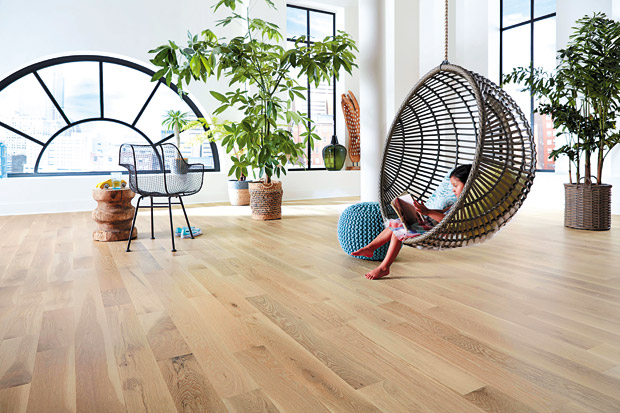Best way to clean wood floors
Although most people envision their dream home with shiny wood floors, many consumers are unaware of the best way to care for them, according to a 2017 survey conducted by the National Wood Flooring Association.
“Not surprisingly, many homeowners are unsure of the best way to effectively and quickly clean hardwood floors. Some believe mopping with a bucket of water and a cleaning solution is best while others occasionally sweep or vacuum. Many cleaning methods can hurt rather than help a floor, for example, even a ‘damp’ string mop can leave excess water on a hardwood floor, and we know that water and wood don’t mix,” said Bona U.S. director of marketing Cate Vanegas.
Just in time to welcome in spring, Bona has introduced its Premium Spray Mop for Hardwood Floors with a larger mop head for faster cleaning, and a full-size cleaning cartridge of cleaner. The new pressurized cartridge dispenses the perfect amount of solution designed to care for hardwood floors.
Lifestyle and design blogger Jennifer Rizzo recently refinished her wood floors, and noted the simplicity firsthand.
“After all the dust bunnies are cleared away, I use a Bona spray mop to clean my floors. It’s odorless, non-toxic and doesn’t leave any residue. It also leaves my floors looking beautiful,” Rizzo said.
Understanding how to clean wood floors is essential to maintain and protect your investment. Here’s how:
Regularly dust and sweep. While using a broom can be effective, it also just pushes the dirt around, so using a microfiber mop or cloth is the best daily defense against scratches and surface damage.
Dust and mop often. After a quick spin around the floor to grab dust, use a microfiber pad mop and residue-free, neutral cleaner.
As needed: When scratches pop up or the finish looks dull, consider a recoat or refinish to keep floors durable and beautiful. Ask an outside contractor for a water-based finish and dust containment system to ensure the job is volatile organic compound and toxin free.
Things to avoid: Water and vinegar, soap-based cleaners, wax or steam cleaners. Vinegar and water will damage and dull the floor’s finish, while soap and wax leave residue. Steam cleaners put heat and excessive water on the floor, which can lead to cupping and long-term damage.
This article is courtesy of Brandpoint.
